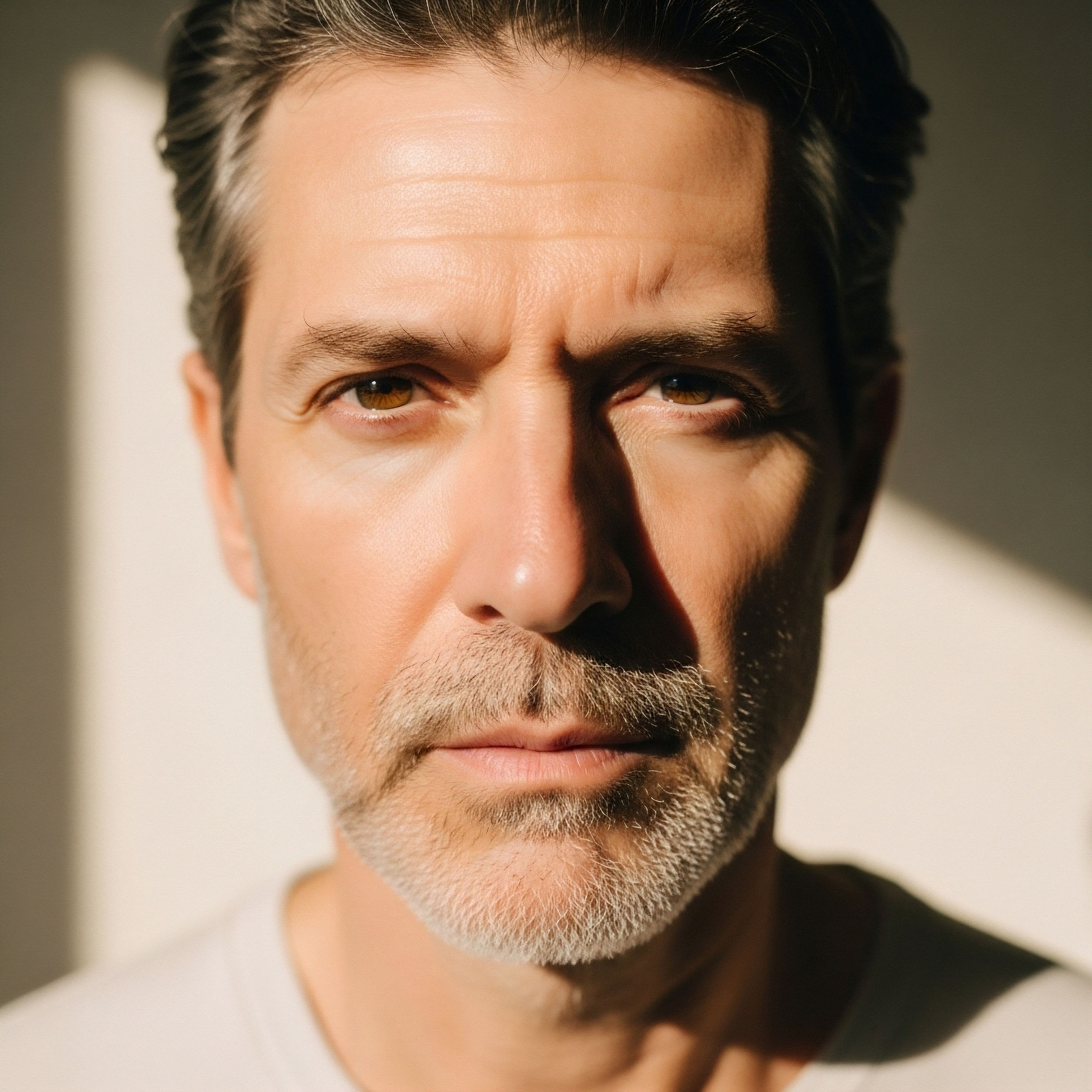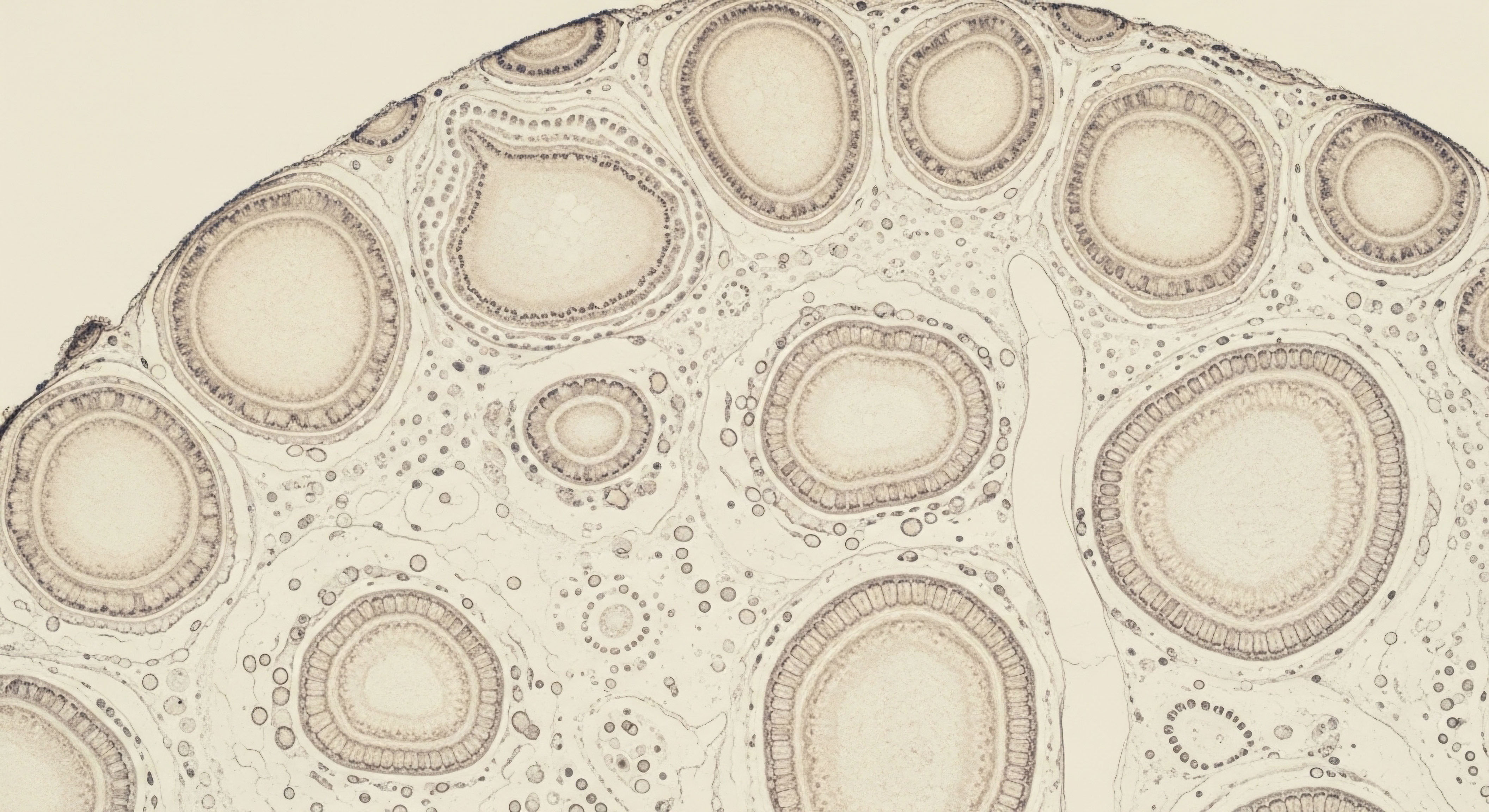

Why Your Brain’s Assembly Line Defines Your Leadership Capacity
Your capacity for impactful leadership is not solely a product of experience or education. It is forged in the silent, cellular furnaces of your own biology. The modern executive operates in an environment of relentless abstraction, complexity, and volatility. Yesterday’s solutions are liabilities today, and tomorrow’s challenges are still undefined. To command this landscape requires more than knowledge; it demands a brain that can physically re-architect itself to meet the moment.
Conventional models of leadership development focus exclusively on software ∞ mindsets, frameworks, and communication styles. They completely ignore the hardware. The true bottleneck for performance is the rate at which your brain can produce new neurons, a process known as adult neurogenesis. This biological function is the very foundation of cognitive flexibility, emotional regulation, and novel problem-solving.
A static brain, one with a decelerated rate of neuron production, is brittle. It relies on established patterns and reacts to stress with rigidity, a death sentence in the modern arena.
We have been conditioned to accept cognitive decline as a simple consequence of time. This is a profound miscalculation. The rate of neurogenesis is not a fixed trajectory. It is a dynamic system that responds directly to specific inputs. You can actively control the manufacturing pace of your most critical cognitive assets.
Viewing neuron production as a deliberate practice is the single most powerful shift a leader can make. It reframes your entire approach to personal and professional growth, moving it from a passive accumulation of facts to an active cultivation of the machinery that processes those facts.
Adult hippocampal neurogenesis has been implicated in cognitive processes under normal physiological conditions such as learning, memory, pattern separation, and cognitive flexibility.
The decision-making, pattern recognition, and resilience demanded of a 21st-century leader are metabolically expensive processes. They require a constant supply of fresh, unspecialized neurons ready to be integrated into existing neural circuits. These new cells are what allow you to connect disparate ideas, to maintain composure under fire, and to see opportunity where others see only chaos.
Your ability to generate them on demand is your most significant competitive advantage. The conversation about leadership must move from the abstract realm of theory into the tangible world of physiology. The ultimate skill is not just managing a team; it is managing the cellular environment that builds the brain capable of leading that team.


The Architecture of Cognitive Renewal
Recalibrating your brain’s production schedule is a matter of precision engineering, not guesswork. It involves a systematic protocol designed to supply the right signals and raw materials to the subgranular zone of the hippocampus, the brain’s neural stem cell niche. Think of this as a biological factory floor.
For this factory to run at peak capacity, it requires specific operational inputs that orchestrate the entire assembly line, from raw material delivery to the final integration of new, high-performance neurons into your cognitive architecture. The protocol is built upon four interconnected pillars, each one a critical system for driving the biological process of cognitive renewal.

Pillar One the Physicality Protocol
Movement is the most potent activator of your brain’s growth-factor cascade. Specific forms of physical activity send a powerful signal to initiate neurogenesis. This is not about generalized fitness; it is about targeted stimulation. Regular exercise is known to increase blood flow to the brain, which stimulates the growth of new brain cells and enhances cognitive function.
- High-Intensity Interval Training (HIIT) ∞ Short bursts of maximum-exertion work followed by brief recovery periods create a powerful metabolic and hormonal signal that floods the brain with Brain-Derived Neurotrophic Factor (BDNF). BDNF is a primary protein responsible for neuron growth and survival. This type of training acts as an acute, high-leverage stimulus for the system.
- Endurance-Based Aerobic Activity ∞ Sustained activities like running or swimming performed at a moderate intensity for 45 minutes or more have a distinct effect. This kind of exertion promotes the proliferation of neural precursor cells, effectively expanding the pool of available raw material for new neuron construction.
- Complex Motor Skill Acquisition ∞ Learning a new physical skill, whether it’s a complex dance, a martial art, or a musical instrument, builds new neural pathways. This activity forces the brain to adapt and wire in new connections, creating a rich environment for newly born neurons to integrate and become functional. It moves beyond simple stimulation to active architectural work.

Pillar Two Precision Nutrition Engineering
Your diet provides the fundamental building blocks for new neurons. A brain operating on nutrient-poor, high-inflammatory fuel cannot be expected to perform high-level cellular construction. Precision nutrition is about supplying the specific molecules that support neuronal membranes, reduce oxidative stress, and facilitate intercellular communication. Many dietary components have been shown to induce neurogenesis in adult brains.

Key Molecular Inputs
Polyunsaturated Fatty Acids (PUFAs) ∞ Specifically, Omega-3s like DHA are a primary structural component of brain cells. A consistent supply is essential for the physical integrity of new neurons. Sources include fatty fish like salmon and mackerel, as well as algae oil.
Polyphenols ∞ These compounds, found in deeply colored plants, act as powerful signaling molecules. Curcumin from turmeric, resveratrol from grapes, and flavonoids from blueberries directly support pathways that lead to neurogenesis and protect existing neurons from damage.
Sulforaphane ∞ Found in cruciferous vegetables like broccoli sprouts, this compound is a potent activator of detoxification pathways in the brain, reducing the inflammatory load that can suppress the neurogenic process.

Pillar Three Strategic Recovery and System Calibration
Growth happens during periods of intelligent rest. A system under constant, high-grade stress diverts resources away from long-term projects like building a better brain and toward immediate survival. Chronic stress is a powerful suppressor of neurogenesis. Strategic recovery is the intentional practice of down-regulating the sympathetic (fight-or-flight) nervous system to allow the parasympathetic (rest-and-digest) system to manage restorative processes, including neuron production.
An enriched environment, which includes a combination of exercise and novel stimuli, can trigger the highest levels of neurogenesis.
This pillar is executed through dedicated practices that lower cortisol and reduce systemic inflammation. Protocols such as non-sleep deep rest (NSDR), specific breathwork patterns (e.g. physiological sighs), and mindfulness meditation are not passive activities.
They are active interventions that recalibrate your autonomic nervous system, creating the precise internal conditions required for the hippocampus to receive the ‘all-clear’ signal for manufacturing new cells. Deep sleep, particularly the slow-wave stages, is when the brain clears metabolic debris and consolidates memories, a process that relies on the plasticity afforded by new neurons.

Pillar Four Advanced Systemic Optimization
The body is a single, interconnected system. The efficiency of your brain’s production line is directly influenced by your underlying metabolic and endocrine health. For those operating at the highest levels, ensuring the global systemic environment is optimized is a non-negotiable part of the protocol.
This involves a data-driven understanding of your personal biology. It means looking at biomarkers for inflammation, metabolic health, and hormonal balance. Hormones are powerful signaling molecules that modulate nearly every process in the body, including the sensitivity of the brain to growth factors.
A body with optimized testosterone levels and insulin sensitivity, for example, is one that is primed for cognitive renewal. This pillar represents a commitment to managing the entire biological chassis, ensuring that the foundational systems are so robust they actively support, rather than hinder, the construction of a superior cognitive engine. This level of optimization moves beyond general advice and into personalized, proactive wellness under expert guidance.


Activating Your Neural Advantage
The protocol for neuron production becomes relevant at the precise moment you acknowledge that your ambition outstrips your current cognitive capacity. It is a strategic decision made when you identify a gap between the leader you are and the leader you are required to become.
The impetus is the recognition that meeting the next set of challenges ∞ whether it’s navigating a corporate restructuring, launching a disruptive venture, or simply staying ahead in a fast-moving field ∞ requires a fundamental upgrade to your mental hardware. You begin this work not when you feel a deficit, but when you choose to build a surplus. It is a proactive investment in your future cognitive state.
The initial signals of progress are subtle, appearing first as shifts in your internal experience. Within weeks of consistent protocol adherence, you may notice a change in your response to high-stress situations. A situation that previously would have triggered a reactive, narrowed focus might now be met with a sense of calm detachment and expanded awareness. This is the first tangible result of enhanced hippocampal function ∞ improved emotional regulation. Your capacity to absorb pressure without cognitive degradation increases measurably.
Observable results in performance follow. After the first few months, you will perceive an acceleration in your ability to learn and synthesize new information. Complex reports that once required intense concentration become easier to parse. You will identify patterns and connections between seemingly unrelated domains with greater speed.
This is the direct payoff of having a supply of new, unassigned neurons, which are crucial for this kind of flexible thinking and pattern separation. Your team may comment on your enhanced creativity or your ability to generate novel solutions to persistent problems. This is the new architecture at work.
Long-term, the sustained practice of this protocol fundamentally alters your leadership trajectory. Over six months to a year, the compounding effect of continuous cognitive renewal becomes your defining professional asset. Your ability to anticipate future trends, to learn from failure without emotional drag, and to inspire confidence in your team becomes deeply ingrained.
You are no longer simply executing from a static base of knowledge. You are operating from a dynamic, adaptive biological platform. The ultimate outcome is a state of cognitive resilience that allows you to not just endure but to seek out complexity and uncertainty, confident in your brain’s capacity to build itself into whatever is required to win.

The Mind Remade
You possess the agency to direct the physical evolution of your own mind. Understanding the levers of neurogenesis moves you from being a passive occupant of your brain to its active architect. The tools of biology are now central to the toolkit of leadership.
The question is no longer what you know, but what your brain is capable of building. The leaders who will shape the coming decades will be the ones who treat their own neural plasticity as their most vital, strategic resource. They will build their capacity to think, to adapt, and to lead, one neuron at a time.

Glossary

leadership development

cognitive flexibility

cognitive architecture

cognitive renewal

brain-derived neurotrophic factor

precision nutrition




